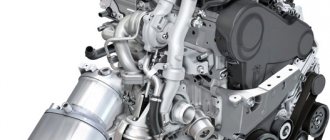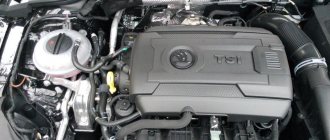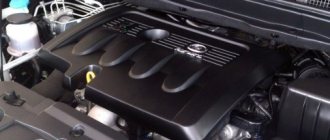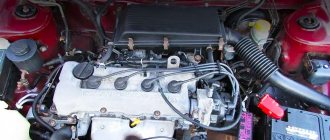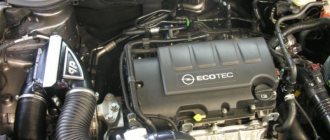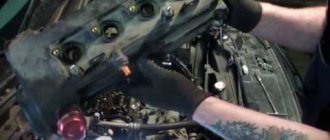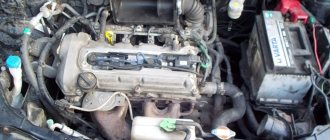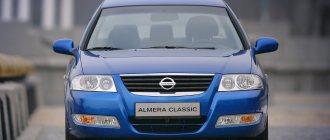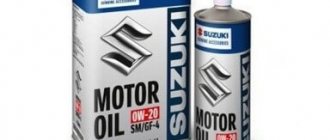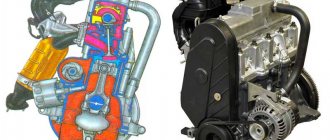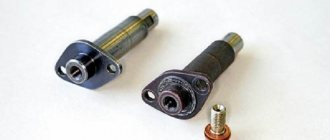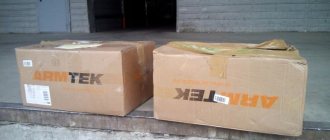Brief description of Volkswagen Tiguan
The concept car debuted in 2006 at the Los Angeles Auto Show. The production car was presented at the Frankfurt Motor Show in 2007. The car is built on the PQ35 platform, which was also used for the Golf Plus. The car can have front-wheel drive or all-wheel drive. The Haldex coupling is responsible for connecting the rear wheels, which is capable of providing variable torque distribution between the axles.
First generation Volkswagen Tiguan
In July 2011, the first generation Volkswagen Tiguan was restyled. The changes affected the appearance and line of power plants. Motors have become more economical and powerful. As a result of the facelift, the car received:
- new headlights;
- radiator grille;
- rear lights;
- bumpers.
Appearance of the car after restyling
The second generation Volkswagen Tiguan was presented on September 15, 2015 at the Frankfurt Motor Show. The basis was the modular MQB platform. The car has become 60-80 kg lighter compared to the previous generation. The equipment of the car has also improved. In the basic version you can find:
- touchscreen infotainment system;
- keyless entry;
- engine start button;
- audio system with 8 speakers;
- V-Tex artificial leather;
- auto-dimming rearview mirror;
- heated front seats;
- rear view camera.
Second generation Volkswagen Tiguan
In 2021, an extended seven-seat version of the Tiguan Allspace and the CC coupe appeared. The official premiere of the cars took place in 2017 in Detroit and at the Geneva Motor Show. The second generation was restyled in 2021. The updated car was presented in July. The machine can boast of having:
- blind spot monitors;
- systems for monitoring the condition and location of the vehicle at a distance;
- automatic emergency braking;
- pedestrian detection systems;
- functions for issuing warnings of the risk of a frontal collision;
- Reverse cross traffic control.
Not everything has been smooth sailing in the history of the Volkswagen Tiguan. For example, in 2021 there was a recall of the company. The problem appeared in the LED roof lighting of the car. Moisture ingress caused a short circuit, which could lead to a fire in the machine. Also in September 2015, laboratory studies showed that the original Volkswagen software underestimates the amount of harmful substances in exhaust gases.
Volkswagen Tiguan powertrains
| Automobile model | Installed motors |
| 1st generation (NF) | |
| Volkswagen Tiguan 2006 | CTHA BWK CAVA CBAB CFFB CBBB CFGB CCZC CAWA TFSI CAWB CCTA CCZA |
| Volkswagen Tiguan facelift 2011 | CAXA CTHA BWK CAVA CLJA CBAB CFFB CCZC CAWA CCZD TFSI CAWB CCTA CCZA CCZB |
| 2nd generation (Mk 2) | |
| Volkswagen Tiguan 2016 | CZCA CZDA CZEA DFGA CZPA CHHB |
Popular engines on the first generation of cars
In the first generation of Volkswagen Tiguan cars, the CAXA power unit became very popular. This engine became one of the most common TSI engines in the history of the brand. The power plant has excellent efficiency. Inflating with a supercharger provides the internal combustion engine with high torque at low speeds, which is especially important when using the machine in urban conditions.
CAXA power unit
The CAVA engine has become no less popular in the Volkswagen Tiguan. The motor is most often found on crossovers in the basic configuration. The internal combustion engine is sensitive to the quality of the fuel being poured. The power plant shows good dynamics both in the city and on the highway.
Motor CAVA
Diesel engines are less common on the Volkswagen Tiguan compared to gasoline engines. Still, under the hood of a car you can often find CLJA. This is a reliable diesel engine, in which the problematic piezo injectors have been replaced with electromagnetic ones. The engine can be easily boosted and has a service life of more than 350 thousand km.
Diesel engine CLJA
In the first generation, the CAWA gasoline unit also gained popularity. The engine has a cast iron cylinder block, providing a service life of 300+ thousand km. The power unit is optimal in terms of the ratio of fuel consumption and dynamic performance. The traction characteristics of the engine allow it to feel confident off-road.
CAWA engine
The CCZB engine is popular on Volkswagen Tiguan crossovers. This is the most powerful engine in the first generation of the car. The power plant boasts a KKK K03 turbocharger. The internal combustion engine fully corresponds to the class of the car and ensures confident driving in any mode.
Powerful CCZB engine
Tiguan: automatic or robotic
It is not difficult to guess that debates regarding whether a DSG gearbox or an automatic transmission and which is better have been going on since the appearance of the first generation of this crossover on the market. Then the manufacturer played it safe and took into account the active demand for traditional machines.
As for the used car market, in the secondary market versions with classic automatic transmissions are traditionally in high demand and are more expensive than analogues with DSG. The main reason is the well-known reliability and maintainability of automatic transmissions compared to DSGs.
We also recommend reading the article about why the DSG gearbox is bad, the disadvantages of this gearbox, etc. From this article you will learn about the main disadvantages and weaknesses of DSG boxes, breakdowns and repairs of transmissions of this type.
Even taking into account the fact that a hydromechanical automatic requires more oil during maintenance, consumes more fuel, changes gears more slowly, there are losses in the gas turbine engine and there is a decrease in efficiency, such a gearbox actually turns out to be more reliable than robotic DSGs.
Naturally, for a used car, this is a decisive indicator when choosing, not only in the case of the Tiguan, but also with various models from other manufacturers. Moreover, automatic transmission often turns out to be a more preferable type of automatic transmission on the secondary market compared to a CVT variator.
Popular engines on the second generation Volkswagen Tiguan
Among Volkswagen Tiguan cars sold on the domestic market, the CZCA engine is highly popular. The prevalence of internal combustion engines in Europe is noticeably less. The engine often exhibits increased oil loss, and during its operation, extraneous sounds are often observed. The plastic pump, which is installed as standard, also does not provide reliability to the engine.
Motor CZCA
CZDA and CZEA engines are very common. The motors are equipped with a system that can turn off a couple of cylinders when operating at low load. The power plants are turbocharged IHI RHF3. The motors are built on the Modularer Quer Baukasten modular platform. MQB made it possible to reduce the size of the engines and unify the connecting dimensions of the pipes.
Modular design of CZDA and CZEA engines
In the second generation Volkswagen Tiguan, the DFGA diesel engine is popular. It is equipped with a Common Rail system. The power unit is widely used in Europe, as it meets all the most stringent environmental standards. The engine design includes a Mahle BM70B turbocharger.
Diesel DFGA
One of the most modern and popular engines in the Volkswagen Tiguan is CZPA. The power unit operates according to the Miller cycle, which provides it with good efficiency. The engine boasts an FSI + MPI power supply system and phase regulators on both shafts. The motor operates under high temperature load, which often results in deformation of certain parts.
CZPA powerplant
In the second generation Volkswagen Tiguan, the CHHB gasoline engine became widespread. This is the most powerful engine found in the engine compartment of the model. The engine lends itself well to tuning, as it has a good margin of safety and a cast-iron cylinder block. The power unit has a number of “childish problems”, but they do not particularly affect the overall reliability and operating comfort.
CHHB engine
Location of VIN and engine number
The main VIN number of the Tiguan is located on the right “cup” under the “jabot” and can be accessed after removing one clip and removing the plastic cover. Duplicate markings are located under the windshield and on the left center pillar sticker. By the way, you can use the latter to find out the engine model. But the number of the power unit itself is located inconveniently - in the front part of the cylinder block at the junction with the gearbox. Access to it is blocked by a mass of wiring harnesses and pipes. The data is duplicated on a sticker on the left side of the engine on the plastic casing near the expansion tank, the only thing is that you shouldn’t trust this piece of paper 100%.
The VIN number will not be difficult to find, but you will have to look for the engine markings and sometimes you cannot do without partial disassembly
Which engine is better to choose Volkswagen Tiguan with?
When choosing a Volkswagen Tiguan from early years of production for city use, it is recommended to take a closer look at cars with a CAVA or CAXA engine. Both engines are sensitive to fuel quality, but when refueled with good fuel they show a long service life. The power units have a cast iron cylinder block, which guarantees excellent maintainability. The intake manifold of the internal combustion engine is made of heat-resistant materials that can easily withstand temperatures up to 950°C without deformation.
Condition of CAVA CPG with solid mileage
If you want to own a car with a diesel power plant, it is recommended to take a closer look at the Volkswagen Tiguan with the CLJA engine. The motor is famous for its indestructibility. The use of the Common Rail power system made it possible to get rid of a number of problems characteristic of previous Volkswagen diesel engines. The power unit not only has a long service life, but also boasts a low content of harmful substances in the exhaust, which has a positive effect on the environment.
Diesel engine CLJA
For those who want to have a reliable engine with good dynamics, but not excessive fuel consumption, the CAWA gasoline power unit is optimal. The cylinder block made of gray cast iron provides a large margin of safety and excellent maintainability. The engine has direct injection, which rarely causes problems. Bad gasoline may cause detonation, which the pistons cannot always withstand. Therefore, choosing a place to refuel a Volkswagen Tiguan with a CAWA engine must be approached as responsibly as possible.
CAWA power unit
When choosing a Volkswagen Tiguan with a more powerful engine, it is recommended to pay attention to the CCZB and CHHB power units. The engines provide the ability to overcome difficult off-road conditions. ICEs also perform well on the track. Their power is enough for dynamic driving, close to sports.
CCZB engine
Volkswagen Tiguan with CZDA and CZEA engines would also be a good choice. Their modular design makes it possible to reduce the weight of the internal combustion engine and its dimensions without losing power. The engine cylinder block is cast from aluminum and has an open cooling jacket. This provides several advantages:
- improved heat removal from the working chamber;
- eliminating the risk of air locks;
- reduction of cylinder deformation during cylinder head installation;
- reduction of oil consumption due to maintaining the geometry of the working chambers.
Cylinder block of CZDA and CZEA engines with open cooling jacket
New Volkswagen Tiguan: DSG gearbox
Let's start with the fact that even taking into account its small size, the second generation Tiguan turned out to be strict and solid, while retaining the main advantages of its predecessor. The engineers also eliminated a number of shortcomings that the first generation of Tiguans had.
Now let's move on to the transmission. The new Tiguan is offered with a time-tested manual transmission and a preselective robot, but an automatic transmission with a torque converter has replaced the DSG-7.
With the “mechanics” everything is clear, the transmission is simple and reliable, which attracts drivers who are accustomed to full control of the car and operating the car in difficult conditions (off-road driving, towing a trailer, etc.). With a manual transmission, the Tiguan can be purchased in Trendline and Comfortline trim levels, as well as front-wheel drive or all-wheel drive.
- Next, let's look at the Volkswagen Tiguan with DSG. It is noteworthy that with the release of the second generation of the crossover, Volkswagen completely abandoned the “classic” automatic. Note that this policy of the company, which overwhelmingly installs only robotic DSGs on its current models, immediately gained both supporters and opponents.
On the new Tiguan 2, two versions of the “robot” are now available, DSG-6 for 1.4 gasoline engines of varying degrees of boost, as well as DSG-7 for 2.0 liter gasoline and diesel units. It is not surprising that potential owners immediately became interested in which version of the Tiguan is better to buy, an automatic transmission or a robot, which is more reliable, automatic transmission or DSG, as well as DSG-6 or DSG-7, etc.
So, if we consider the DSG-6, this gearbox with a “wet” clutch has proven itself well after entering the market, but the next version of the DSG-7 with a “dry” clutch is in no way a standard of reliability.
- Please note that both DSG-6 and DSG-7 on the new Tiguan are “wet” and not dry. This means that such a gearbox is definitely more reliable than “dry” DSG-7. Taking into account this information, it becomes clear why the manufacturer completely abandoned the traditional automatic transmission in favor of the DSG-7 robot.
If the “dry” DSG 7 was prone to serious breakdowns even on short runs (already at 80-120 thousand km) and turned out to be poorly prepared for difficult operating conditions, the DSG -7 box with a “wet” clutch (similar to the “wet” DSG -6) has established itself as a completely reliable unit that can compete with conventional automatic transmissions.
For this reason, Volkswagen installed the latest DSG-7 with the DQ500 index on its new Tiguan instead of a hydromechanical automatic transmission. Such a robot is more economical and relatively reliable, withstands up to 600 Nm of torque. In practice, the unit is quite sufficient for models with medium-sized engines that do not develop too much torque. As a rule, this is quite enough for the average user and normal operating conditions.
It turns out that for calm drivers who mainly use the crossover in the city, and do not plan to chip-tuning the Tiguan or harsh operating conditions, the best option would be a 1.4-liter engine paired with a DSG-6. Such a box is capable of driving 150 thousand km. and more (subject to compliance with the rules of operation and maintenance).
If the driver practices an active or even aggressive driving style, and also drives off-road or loads the car, it is better to pay attention to the version with DSG-7 DQ500. You can also do chip tuning of the engine without unnecessary fears that the box may not withstand the loads.
Oil selection
At the factory, the manufacturer fills Tiguan engines with Volkswagen Special Plus 5W-40 branded oil. Official dealers also recommend using the same lubricant. It has an optimal additive package to extend the life of the power unit. A gasoline engine must be filled with oil with a tolerance of 502.0/505.0, and a diesel engine - 504.0/507.0.
Branded lubricant
The power plants of Volkswagen Tiguan vehicles can be filled with lubricants from third-party manufacturers. It is recommended to choose famous brands. Their motor fluids often surpass branded oil in their characteristics. Some of the best lubricant manufacturers for Tiguan are:
- Ravenol;
- ZIC;
- Liqui Moly;
- Mobil;
- Idemitsu;
- Motul.
When choosing oil for Volkswagen Tiguan, it is necessary to take into account the ambient temperature in which the car is operated. The colder the climate, the thinner the lubricant should be. In regions with high temperatures, preference should be given to more viscous oils. Grease is also required for cars with significant mileage.
Determination of oil viscosity depending on the operating temperature of Volkswagen Tiguan
Volkswagen Tiguan engines can be equipped with a particulate filter. In this case, it is recommended to use a grease with a 507.0 tolerance. It is resistant to temperature and mechanical loads. If a diesel engine does not have a particulate filter, then it is recommended to use oil with a 504.0 approval.
If you are in doubt about the correct choice of oil, it is recommended to check it. To do this, you need to unscrew the dipstick and drip lubricant from it onto a clean sheet of paper. Next, you need to evaluate the appearance of the stain and compare it with the image below. If the wrong oil is used, it must be drained and replaced as soon as possible.
Options for grease stains on a sheet of paper
Owner reviews about the resource of the power unit
Both turbo engines are of high quality and reliable, have high speed characteristics, but are extremely demanding on the quality of fuel and engine oil, and are sensitive to coolant. All three components must be closely monitored, otherwise you will have to invest in expensive car repairs. Now let's move directly to the reviews of Volkswagen Tiguan owners, who experimentally determined the duration of trouble-free operation of the car's main power unit.
Engine 1.4
The 1.4-liter power unit is quite good in its characteristics. However, we are too dependent on the quality of fuel, regularity of maintenance and many other external factors. Not the most successful development of German engineers, which is confirmed by reviews of former and current owners of the Volkswagen Tiguan 1.4.
Engine 2.0
Many car owners agreed that the 2-liter power plant is more reliable and stable in relation to adverse operating conditions. Numerous studies also confirm the fact that in practice the service life of the Volkswagen Tiguan 2.0 engine is more than 300 thousand kilometers.
Source
Engine reliability and their weaknesses
CAXA engines are very reliable and have virtually no weak points. The considerable age of early engines still affects their condition. Refueling with low-quality fuel aggravates the number of problems. So, with mileages of more than 200-270 thousand km, CAXA power units exhibit the following problems:
- excessive stretching of the timing chain;
- turbocharger control valve failure;
- the appearance of cracks on the pistons;
- formation of carbon deposits on valves;
- destruction of the partitions between the piston rings;
- the appearance of antifreeze leaks;
- excessive vibration of the power unit, especially noticeable during warm-up.
Motor CAXA
Most problems with the CAVA engine are associated with refueling with low-grade gasoline. The power unit does not tolerate detonation well. Therefore, the engine performs well when operating a car in a metropolis, where the quality of the fuel is more or less controlled. The appearance of detonation reveals a number of weak points of the CAVA engine:
- noticeable drop in compression;
- the appearance of cracks and other damage to the pistons;
- formation of scoring on the cylinder bore.
CAVA engine piston damaged by detonation
The weak point of CAWA engines is the timing chain. It stretches more than normal even with small shoots. When refueling with domestic fuel, a large amount of soot forms in the engine. It is deposited on the valves, causes instability of the engine crankshaft speed and leads to jamming of the intake manifold swirl flaps. You can usually get rid of carbon deposits exclusively by mechanical cleaning.
Carbon deposits inside the working chamber of the CAWA power plant
The CCZB engine often has high oil consumption. The reason for this lies in the location of the rings. High engine power affects the load on all elements, including spark plugs. Some car owners complain about the destruction of the ceramic insulator. Its fragments enter the working chamber, causing damage to the piston and cylinder mirror.
Broken ceramic spark plug insulator
Damage to the piston of the CCZB power unit
Most Volkswagen Tiguan powertrains use a cast iron cylinder block, but there are exceptions. For example, CZDA and CZEA engines have a block cast from aluminum. This reduces the resource of the internal combustion engine, but has a positive effect on the weight of the motor and heat dissipation. Also, engines often experience uneven wear on the camshafts. The reason for this lies in the system that shuts off two cylinders when operating under light load.
CZEA powerplant
Maintainability of power units
The engines of the first generation Volkswagen Tiguan have better maintainability than the engines of later cars. The reason for this lies in the simpler electronics and design of the internal combustion engine. The material of the cylinder block casting also affects maintainability. The use of cast iron not only increases the service life, but also increases the chances of a successful overhaul.
A striking example of a motor with good maintainability is the CAVA engine. Its overhaul allows you to restore the life of the internal combustion engine by 85-95% relative to a new unit. During capitalization, it is recommended to use a set of forged pistons. In this case, it is possible to solve the problem of damage from detonation and increase the overall reliability of the power unit.
CAVA engine rebuild process
Diesel power plants, for example, the CLJA engine, also have excellent maintainability. After capitalization, internal combustion engines often travel up to 400 thousand km. The absence of weak points allows you to operate the Volkswagen Tiguan with CLJA with virtually no need to fix minor faults. The excellent maintainability of the motor is indirectly confirmed by its significant demand in commercial vehicles.
CLJA diesel power plant overhaul process
The powerful CCZB engine also has good maintainability. Car owners often decide to overhaul it to eliminate increased oil consumption. The engine rarely requires cylinder boring. Usually it is enough to replace the oil scraper and compression rings. During the first overhaul, it is advisable to replace the original pistons with forged ones.
Capital CCZB
Second-generation engines are repairable, but capital investment doesn’t always make sense. For CZDA and CZEA engines, distortion of the geometry of the aluminum cylinder block may be observed. In this case, it is more profitable to purchase a contract power plant. The internal combustion engines of the second generation Volkswagen Tiguan are still amenable to minor repairs and purchasing spare parts is rarely difficult.
CZDA power unit
Motor ratings
First, let's answer which is better: a Tiguan with an engine capacity of 1.4 or 2.0? Owners of the first option complain that the designers miscalculated the service life of the pistons.
The largest resource reserve is the 1.4 liter engine, 125 horses. The next version is 1.4 l. from 150 hp surpasses its predecessor with a reliable turbine and an additional phase shifter at the inlet. The version of the power unit won many victories, but for a large crossover it turned out to be rather weak. Active use and thermal exposure led to detonation and even burnout of the pistons.
1.4 TSI engine in Tiguan from Volkswagen (photo)
Reliability
Many people wonder which engine for the Volkswagen Tiguan is the most reliable. First, about the bad - owners with 2.0 liter Tiguan engines have the most problems.
- Stretching and abrasion of the chain belt structure in Tiguan engines leads to numerous troubles due to teeth jumping. True, a faulty element produces increased noise, and the driver can promptly notice and fix the problem.
- An equally common problem is increased oil consumption. The piston system and rings are designed incorrectly, which during operation leads to clogging of the ducts with excess oil and to coking of the system.
Read also: Replacing stabilizer bushings on Passat B3
The most powerful in the line are gasoline power units of 180 and 200 hp. These engines have different intake systems, compression ratios, electronic control units and other technical elements. Tiguan engines are characterized by turbocharging and high power.
So, which engine for the Volkswagen Tiguan is the most reliable? There is no definite answer, but, according to reviews from owners, the best options are:
- 1.4 l., 150 hp The advantage is a reliable turbine and a second phase shifter.
- 2.0 l., 150 hp It is economical and high-torque. The disadvantages include increased noise and demands on the quality of diesel fuel.
Information about the most reliable Tiguan engine is not documented, so we can say that a more powerful power unit is suitable for use outside the city. With an additional engine reserve of 220 hp. can only be viewed on the highway.
Engine for VW Tiguan 2015
Best options
Which engine is better in Tiguan? Based on reviews from owners, it is difficult to say that one type of engine is problematic and another is not. Reliability and stable operation depend on timely maintenance and the use of high-quality consumables and fuels and lubricants.
In Europe, engines for the new Tiguan are available with 130 and 150 hp. and volume 1.5 l. Therefore, which engine is better to take the Tiguan with depends on the preferences of the future car owner.
2.0 liter power unit adapted to European standards. became a little more powerful - 190, 220 and 230 hp. Russian requirements have not been revised, so there are no plans to modernize the engines.
Engine options for VW Tiguan 2017
Chip tuning of Volkswagen Tiguan engines
Chip tuning of the Volkswagen Tiguan power plant is very popular among car owners. Reflashing the electronic control unit allows you to change the dynamics and fuel consumption. There are a lot of ready-made solutions for reducing fuel consumption without a noticeable loss of acceleration. Depowering is popular among car owners who operate their car primarily in urban environments and do not like a sporty driving style.
Volkswagen Tiguan cars leaving the factory have power plants under the hood that are stifled by environmental standards. You can unlock their potential with the help of chip tuning. At the same time, there is no noticeable reduction in the resource of the internal combustion engine. Existing ready-made solutions can add 15-20 hp.
Chip tuning can give even more impressive results. To do this, you need to contact a professional tuning studio. During the flashing process, repeated reading of the power and torque curves is required. An individual approach to boosting the engine allows you to add 60-70 hp. to existing ones.
Recording torque and power curves during CAXA engine chip tuning
It is possible to successfully influence the torque by changing the turbocharging settings. In some cases, it is recommended to install a stock turbine. Together with flashing the ECU, this will add up to 100 hp. In this case, the increase in torque will be noticeable throughout the entire crankshaft speed range.
Chip tuning has one undeniable advantage over other methods of forcing. If the result is unsuccessful, there is always the option to return to the factory settings. It should be taken into account that long-term operation of a car with poor firmware will negatively affect the service life of the engine. Therefore, it is better to trust chip tuning to professionals.
Or maybe Volkswagen Tiguan diesel is better instead of gasoline: dealer subtleties
What does the manufacturer offer? There is only one diesel unit in the line - a two-liter, 150 horsepower. It is opposed by 4 TSI petrol power plants:
- 2 – volume 1.4 liters, 125 and 150 horsepower.
- 2 – with a total volume of 2.0 liters of 180 and 220 “horses”.
To a first approximation, it becomes clear that in the question of Tiguan diesel or gasoline and what to choose for urban and intercity travel, the moment of power superiority of the heavy fuel vehicle is leveled out. Therefore, in this battle, the diesel version has one clear advantage: efficiency. This modification consumes up to 7 liters per “hundred” when driving both in the city and on the highway.
The advantage in fuel savings is not the only one. A review of dealer offers suggests that the diesel modification is cheaper than top-end high-octane lighters:
- 2.0 TDI – 1,899,000 rubles.
- 2.0 TSI (180 hp) – 1,989,000 rubles.
- 2.0 TSI (220 hp) – 2,259,000 rubles.
The manufacturer focuses on the diesel version. Because in monetary terms, its only all-wheel drive competitor is the 1.4-liter TSI with 150 hp. With equal power potential, this design cannot compete in a traction experiment. The 2.0 TDI “steam locomotive” is capable of producing 340 Nm of torque. The gasoline modification is only able to resist 250 Nm, which means only one thing - it definitely loses to a diesel engine in the following:
- Elasticity.
- Off-road driving.
- Traction reserve when overtaking on the highway.
To achieve diesel dynamics, this gasoline engine must be “twisted”. This is despite the fact that there is a turbine and all thrust is available from 1,500 rpm. Meanwhile, the power pressure of the gas engine does not subside after 3,500 rpm. But the opponent on diesel fuel already “sours” after reaching these speeds. Its prerogative is calm travel on the highway and dynamic driving in the city.
Boosting power units
Boosting the Volkswagen Tiguan power unit is possible in other ways besides chip tuning. The simplest solution to increase power is to use a zero-resistance air filter. The use of direct flow also allows you to increase horsepower. The use of lightweight pulleys slightly improves the dynamics. When performing tuning, it is important to take an integrated approach, therefore, when increasing engine power, it is necessary to pay attention to the braking system, gearbox, cooling and other components on which the load has increased.
Volkswagen Tiguan tuning process
Superficial tuning adds only 5-30 hp. to the available power. If this is not enough, car owners decide on deeper alterations. In the simplest case, a more powerful turbocharger is installed. Sometimes the cylinder head assembly is changed.
Deep tuning involves a complete overhaul of the power plant. The achieved power of Volkswagen Tiguan engines reaches 400-600 hp. In this case, the pistons, crankshaft and camshafts must be replaced. High-strength stock forged parts are very popular.
Powerplant bulkhead
When performing deep tuning, all risks must be taken into account. Incorrect selection of parts can permanently damage the power unit. Therefore, you should not use spare parts from third-party unknown manufacturers. The strength of such parts is always in question.
Not all Volkswagen Tiguan engines are equally suitable for tuning. Gasoline diesel power plants with a cast iron cylinder block have a sufficient margin of safety. Their forcing does not noticeably affect the resource. The situation is different with aluminum cylinder blocks. Such engines do not tolerate increased power well, so when tuning them, it is recommended to add no more than 15-40 hp.
Swap engines from VW Tiguan
Volkswagen Tiguan cars use a large number of good engine models. They are in demand for swaps. Rearrangement of power units is carried out for crossovers, light SUVs, minivans, commercial vehicles and other passenger cars. The swap is used both on Volkswagen cars and on cars from other manufacturers.
The engines of the first generation Volkswagen Tiguan are much better suited for swapping than the second. The reason for this lies in the more complex powertrain electronics of later car models. For normal operation, an internal combustion engine needs to receive information from 20+ sensors. This makes it much more difficult to swap for other cars. In some cases, in addition to installing a new engine, it is necessary to change the dashboard or other elements.
Sample list of sensors
Engine swap for Volkswagen Tiguan
Engine swaps for Volkswagens are very popular. Very often, internal combustion engines from other Tiguan cars are used for installation. Car owners are replacing gasoline engines with diesel engines and vice versa. Swap allows you to achieve improved vehicle dynamics or reduce fuel costs.
Engine swap process for Volkswagen Tiguan
Power units from other models and brands of cars are also used for swapping. The 1JZ and 2JZ engines are especially popular. They are great for tuning and fit well in the engine compartment of a Volkswagen Tiguan. It should be taken into account that the car has complex electronics, so after a swap not all systems may work correctly.
Purchasing a contract engine
Volkswagen Tiguan engines are very common, so there are a large number of contract engines on sale. ICEs from the first generation of cars often have a solid mileage. Despite the good maintainability of the engines, it is recommended to avoid “dead” power units. When selecting, it is advisable to look at internal combustion engines whose price exceeds 60-100 thousand rubles.
Volkswagen Tiguan contract engine
The engines of the second generation Volkswagen Tiguan have sophisticated electronics. Therefore, before purchasing a contract motor, it is advisable to pay attention to preliminary diagnostics. Troubleshooting any problems can be very expensive. Therefore, it is advisable to immediately take the unit in proper condition.
What engines are installed on the Volkswagen Tiguan
Before purchasing, the future car owner studies reviews, compares power, cross-country ability, power unit size and many other characteristics. Therefore, a reasonable question arises about which engine is better to take a Volkswagen Tiguan with.
There are 5 types of engines in use that are installed on the Volkswagen Tiguan.
| Volume and power of Tiguan engines | Transmission | Additional Description |
| 1.4 l., 125 hp | Manual transmission or 6-speed robot. | It is equipped with a TD025 M2 turbine, an aluminum cylinder block, a belt-type timing belt and 1 phase shifter. |
| 1.4 l., 150 hp | 6-speed manual or robot | More powerful turbine IHI RHF3. Transmission of traction to the front or all wheels. |
| 2.0 l., 150 hp | 7 speed robot | Cast iron cylinder block, all-wheel drive. Diesel fuel. |
| 2.0 l., 180 hp | 7-speed robotic | Improved performance compared to the previous version - eternal chain gas distribution. |
| 2.0 l., 220 hp | 7-speed robot |
Volkswagen Tiguan engines last for different amounts of time depending on their design features.
Volkswagen Tiguan with TDI
